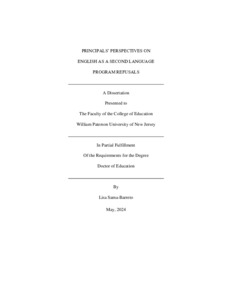Please use this identifier to cite or link to this item:
http://hdl.handle.net/20.500.12164/3437Full metadata record
| DC Field | Value | Language |
|---|---|---|
| dc.contributor.author | Sama-Barreto, Lisa | - |
| dc.date.accessioned | 2024-05-20T19:02:44Z | - |
| dc.date.available | 2024-05-20T19:02:44Z | - |
| dc.date.issued | 2024-05-09 | - |
| dc.identifier.uri | http://hdl.handle.net/20.500.12164/3437 | - |
| dc.description.abstract | The purpose of this study was to examine how principals’ perspectives and experiences influenced the type of support they provided to students in their schools after parents refused English as a Second Language services for their eligible children, and if comprehensive programming impacted English language instruction when parents refused services. The researcher followed a qualitative research design and interviewed principals to conduct this study. Data collection and analysis relied heavily on the phenomenological research method. The data collected included open-ended semi-structured interview questions and anecdotal notes. The researcher interviewed six principals from three counties in New Jersey. The principals described themselves as being culturally responsive, and shared how they advocated for their students while combating systems of oppression. The research shows that the principals’ individual backgrounds, such as having experience teaching or leading English as a Second Language students, mattered and influenced their response to parental refusals of students who qualify for English as a Second Language services. The research also shows that comprehensive programming does not impact the academic support principals provide students of program refusals, but it is the principals themselves working with other key stakeholders in their districts that ensure students are supported and information is communicated effectively to parents. Implications from this research suggest the need for an adequate academic support plan for students whose parents refused services and the importance of effective communication being key. | en_US |
| dc.format.extent | 100 pages | en_US |
| dc.language.iso | en_US | en_US |
| dc.publisher | William Paterson University | en_US |
| dc.subject | Education | en_US |
| dc.subject | Educational leadership | en_US |
| dc.subject | Communication | en_US |
| dc.subject | English language learners | en_US |
| dc.subject | Instructional considerations | en_US |
| dc.subject | Partnerships | en_US |
| dc.subject | Programming | en_US |
| dc.subject | Refusal | en_US |
| dc.subject.lcsh | Education | en_US |
| dc.title | Principals’ Perspectives on English As A Second Language Program Refusal | en_US |
| dc.type | Dissertation | en_US |
| Appears in Collections: | Theses & Dissertations | |
Files in This Item:
| File | Description | Size | Format | |
|---|---|---|---|---|
| SamaBarreto_ESLRefusals.pdf | 502.63 kB | Adobe PDF |  View/Open |
Items in DSpace are protected by copyright, with all rights reserved, unless otherwise indicated.
